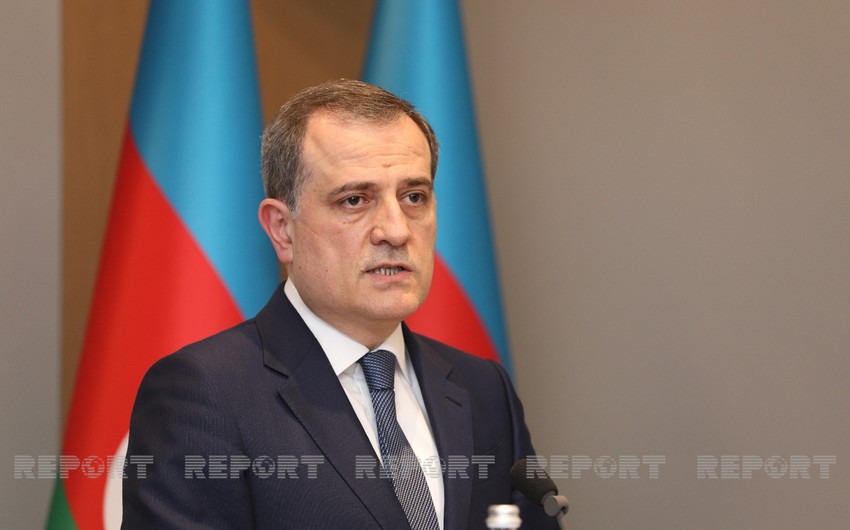"The Armenian-Azerbaijani Nagorno-Karabakh conflict ended with a trilateral statement signed by the leaders of Azerbaijan, Russia and Armenia on November 10, 2020. The Patriotic War, which began on September 27, ended in a great victory under the leadership of the victorious Supreme Commander-in-Chief. The tripartite statement is a comprehensive document containing several important provisions, as well as an end to hostilities between the parties," Foreign Affairs Minister of Azerbaijan Jeyhun Bayramov told media, Report informs.
The minister noted that the tripartite statement was a confirmation of Azerbaijan's glorious victory on the battlefield.
The statement called for the cessation of hostilities, the deployment of a Russian peacekeeping contingent to ensure security in the region, the withdrawal of Armenian forces from Azerbaijan, the return of IDPs, the exchange of prisoners of war and hostages, as well as the restoration of all economic and transport ties.
The joint statement reflected President Ilham Aliyev's commitment from the first day of military operations to withdraw the Armenian Armed Forces from the Azerbaijani territories within a specific time frame. According to the statement, Armenia was forced to withdraw its occupying forces from the Aghdam, Kalbajar and Lachin districts of Azerbaijan. Azerbaijan liberated these territories with a diplomatic victory without additional bloodshed, preventing casualties.
The statement specified the deployment of Russian peacekeepers in the region, the number of the contingent, military equipment and their location, and underlined that this deployment was to be carried out within a specific time frame. A memorandum was signed on November 11, 2020, on establishing a ceasefire control center, and on January 30, 2021, the Turkish-Russian Joint Monitoring Center was opened in the liberated Aghdam district. It ensured Turkey's official participation in the ceasefire control process."
The tripartite statement ensured the restoration of the fundamental rights of about one million IDPs who have been victims of Armenia's policy of ethnic cleansing and whose rights to live in their homes had been grossly violated. The statement also reflected the return of IDPs and refugees to Karabakh under the supervision of the Office of the UN High Commissioner for Refugees:
"One of the other important provisions of the statement is the paragraph included at the insistence of President Ilham Aliyev, which envisages the establishment of a land connection between the Nakhchivan Autonomous Republic and Azerbaijan proper. This historic step towards unifying the Nakhchivan Autonomous Republic with Azerbaijan proper by land is also vital for the region's future economic development. After the signing of the statement, this provision, which the Armenian side tried to obstruct, is in fact in the interests of the region's countries from an economic point of view.
One of the most important points about the statement is that it does not contain any provisions on the status of Karabakh. For many years, the Azerbaijani side had stated the possibility of granting Karabakh the status of autonomy within Azerbaijan. This position was expressed within the negotiation process framework. However, the Armenian side acted unreasonably and did not renounce the claims to 'independence.' After restoring our territorial integrity as a result of the Great Patriotic War, the head of state announced that the status issue was a thing of the past. East Zangazur and Karabakh economic regions were established by the Presidential Decree dated July 7, 2021. Of course, Armenians living in this region will enjoy equally all the rights and freedoms enshrined in the Constitution of the Republic of Azerbaijan. Therefore, the absence of any provision on this issue in the tripartite statement was another manifestation of the thought-out policy.
President Ilham Aliyev's brilliant diplomatic victory is the historically significant joint statement that puts an end to hostilities, covers many important issues, and sets the necessary framework for peace and security in the region."


 https://static.report.az/photo/ae5d2e1a-e543-30b5-b07d-d4ae52252942.jpg
https://static.report.az/photo/ae5d2e1a-e543-30b5-b07d-d4ae52252942.jpg

